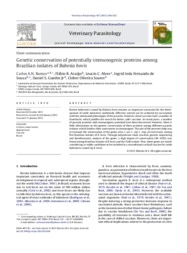Genetic conservation of potentially immunogenic proteins among Brazilian isolates of Babesia bovis.
Genetic conservation of potentially immunogenic proteins among Brazilian isolates of Babesia bovis.
Author(s): RAMOS, C. A. N.; ARAUJO, F. R.; ALVES, L. C.; SOUZA, I. I. F. de; GUEDES JUNIOR, D. S.; SOARES, C. O.
Summary: Bovine babesiosis caused by Babesia bovis remains an important constraint for the development of cattle industries worldwide. Effective control can be achieved by vaccination with live attenuated phenotypes of the parasite. However, these vaccines have a number of drawbacks, which justifies the search for better, safer vaccines. In recent years, a number of parasite proteins with immunogenic potential have been discovered. However, there is little information on the genetic conservation of these proteins among different parasite isolates, which hinders their assessment as immunogens. The aim of the present study was to evaluate the conservation of the genes ama-1, acs-1, rap-1, trap, p0 and msa2c among five Brazilian isolates of B. bovis. Through polymerase chain reaction, genetic sequencing and bioinformatics analysis of the genes, a high degree of conservation (98?100%) was found among Brazilian isolates of B. bovis and the T2Bo isolate. Thus, these genes are worth considering as viable candidates to be included in a recombinant cocktail vaccine for cattle babesiosis caused by B. bovis.
Publication year: 2012
Types of publication: Journal article
Unit: Embrapa Beef Cattle
Keywords: Babesia bovis, Brazil, Genetic conservation, Vaccine
Observation
Some of Embrapa's publications are published as ePub files. To read them, use or download one of the following free software options to your computer or mobile device. Android: Google Play Books; IOS: iBooks; Windows and Linux: Calibre.
Access other publications
Access the Agricultural Research Database (BDPA) to consult Embrapa's full library collection and records.
Visit Embrapa Bookstore to purchase books and other publications sold by Embrapa.

